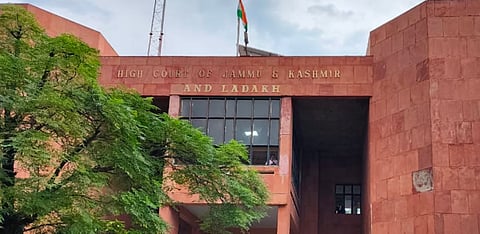

The High Court of Jammu & Kashmir took serious note of how the senior superintendent of police at Srinagar, profiled Waqas Riyaz Khan "staunch overground worker" who was "engaged actively to propagate extremist ideology in Srinagar" rather than issuing the preventive detention Order on factual grounds.
—
THE High Court of Jammu & Kashmir and Ladakh at Srinagar has quashed the preventive detention Order issued against 26-year-old Waqas Riyaz Khan under Section 8 (detention of certain persons) of the Jammu and Kashmir Public Safety Act, 1978.
Khan's personal liberty was curtailed based on a dossier submitted by the senior superintended of police (SSP), Srinagar, to the district magistrate. The SSP projected Khan a "staunch overground worker" who is involved in "harbouring, aiding and abetting terrorism in Kashmir valley" by forming a "gang of anti-national elements" with an object to "disturb peace and tranquillity" of the Union territory of Jammu and Kashmir.
Justice Rahul Bharti held that the dossier on the basis of which the magistrate formulated the grounds for subjecting Khan to preventive detention was "nothing but an opinionated caricature of the petitioner [Khan] sketched by the SSP".
The court said that it is left seriously concerned by the 'tone and tenor' of the purported grounds of detention.
A preventive detention Order was issued against Khan on December 31, 2022 on the grounds that he acted in a manner prejudicial to the "maintenance of the security of the State".
The Order of preventive detention was passed by a magistrate in Srinagar based on the dossier which stated that Khan bore a "radical ideology right from his childhood" and was "inclined towards terrorism and instigated youth to indulge in anti-national activities".
The SSP in the dossier claimed that Khan is well-trained to engage in anti-national activities while managing to remain out of sight from the eyes of law enforcement agencies. Because of that, he managed to provide "logistics to anti-national elements of the area and for the perpetuation of anti-national activities".
As per the SSP, Khan has a "potential" to "instigate" the youth against the Union territory of J&K. The SSP cited the previous involvement of Khan during the '2019 unrest'.
He stated that two first information reports (FIR) were registered against Khan on that occasion. The first FIR was registered under Sections 147 (punishment for rioting), 148 (rioting, armed with deadly weapon), 149 (every member of unlawful assembly guilty of offence committed in prosecution of common object), 336 (acts endangering life or personal liberty of others) and 427 (mischief causing damage to the amount of fifty rupees) of the Indian Penal Code. The second FIR was registered under Sections 147, 148, 149 and 336 of the IPC. Reportedly, in both cases, Khan was released.
In the present case, Khan's father filed a habeas corpus petition before the high court under Article 226 of the Indian Constitution, seeking to quash the preventive detention Order against Khan.
The high court termed the SSP's dossier as a "fact missing dossier" which was made the basis of the grounds of detention.
In this regard, the court said: "Both the dossier as well as the grounds of detention are found staying and operating at the same level of being fact-deficient which by no stretch of factual and legal reasoning could be said to be providing an occasion for subjecting the petitioner for loss of his fundamental rights of personal liberty."
The high court held that the preventive detention Order did not provide the factual basis of how Khan was projected as claimed in the dossier.
In this regard, the court said: "If taken as it is, then any law-abiding citizen can be stereotyped at the hands of the law and enforcement agency or authority for the sake of being put behind bars, not for any penal any of omission and commission on his or her part amounting to the violation of law but just for the reasoning that law and enforcement agency or authority is so profiling a person to be a bad person."
Click here to read the order.